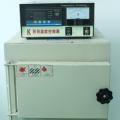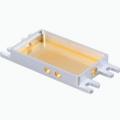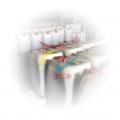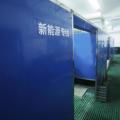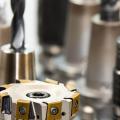Korea Materials Research Institute successfully developed a new surface treatment technology for aluminum powder
Recently, Dr. Kyung-tae Kim's research team at the Powder/Ceramic Research Headquarters of the Korea Materials Research Institute has successfully developed a surface treatment technology for extremely fine aluminum powder in Korea, which increases the reactivity with oxygen by more than two times compared to existing aluminum powder materials and ensures operational stability.
This technology removes the dense oxidation film on the surface of aluminum powder and covers it with thermodynamically stable fluorinated organic compounds. Compared with the naturally formed oxidation film, the organic coating can be easily removed by heat at a lower temperature. And as a solid fuel, the aluminum powder can have a higher oxidation reactivity under the conditions of high energy generation. Compared with aluminum, it is easier to be stored safely under normal temperature and pressure.
When pure aluminum is combined with oxygen, the oxidation reaction speed is very fast and the heat generated is high compared with other materials. With the help of the violent oxidation reaction of aluminum powder, the United States, Russia and other countries use it as rocket propellant, gunpowder and welding material, and it is widely used in aviation, civil and defense military industries. Only when the dense and solid oxidation film on the surface is completely removed, the excellent properties of aluminum powder such as oxidation reactivity and electrical conductivity can be fully exerted, which requires at least 1000℃ of heat. Moreover, in the process of removing the oxidation film, pure aluminum is directly exposed to the atmosphere, and there is also a high possibility of explosion, which is another problem for researchers of aluminum powder.
To solve these problems, the Materials Research Institute research team tried to easily remove the oxidation film formed on the surface by using fluorinated organics, which can improve the stability and reactivity of the aluminum powder itself. The coated aluminum powder can be stripped of the organic coating at temperatures below 250°C. The reaction rate can be increased by at least two times compared to aluminum powder with oxidation film of the same size. It is worth mentioning that it is easy to build related equipment for mass production using existing coating process technology.
In the future, this technology will help improve the oxidation reactivity of aluminum powder, which can be used as a solid fuel for artificial satellite launch rockets and a raw material for brazing. Combined with organic matter bonding and mixing technology, it can be used as a material for various electronic components including photovoltaic cells and highly conductive metal solder, which is expected to enhance the added value of aluminum powder and replace imported powder materials.
Kyung-tae Kim, head of the research team, said that if this technology is commercially applied, aluminum powder can create great value in both defense and electronic parts, and will play a huge role in the development of materials and technology for Korea.


